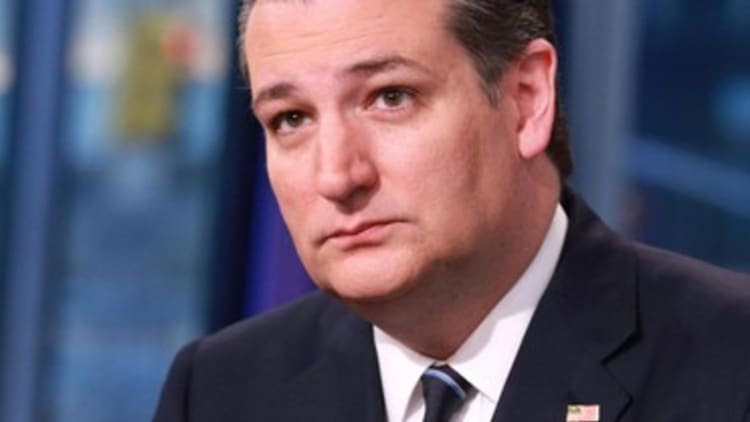
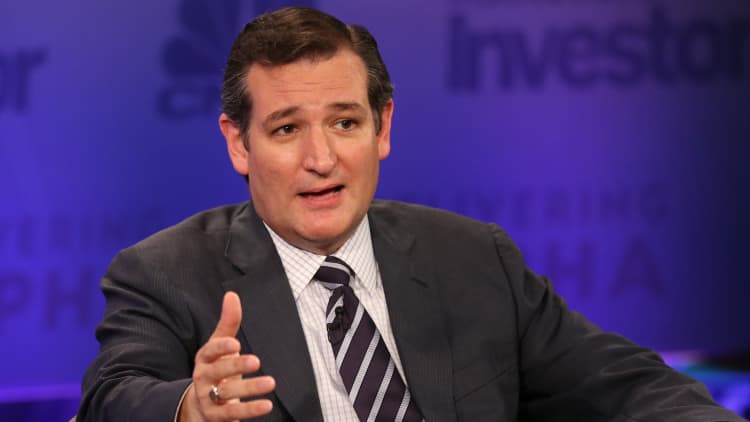
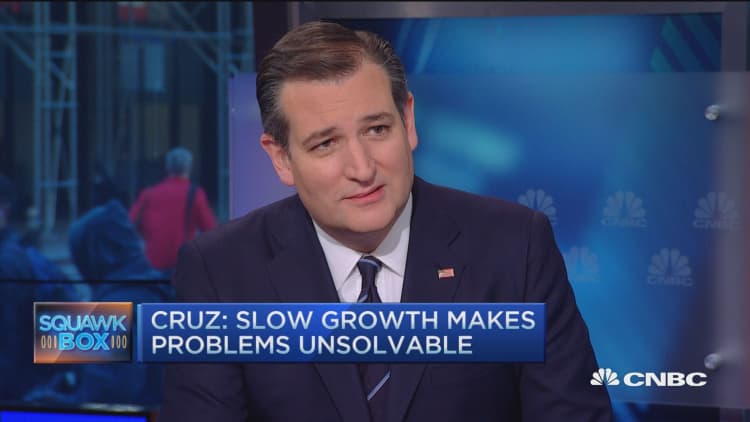
The Federal Reserve's excessively easy monetary policies are "playing games with money" and are an ineffective way to "juice the system," GOP presidential candidate Ted Cruz told CNBC on Friday. Such actions "create bubbles," he said.
"The Fed has, for those with assets, driven up stock prices," he said in a wide-ranging "Squawk Box" interview four days before the New York primary, which has 95 delegates at stake.
"But that's not built on anything real. It's not built on an increase in the intrinsic value of those assets," he said. "That's just playing games with money, which means a crash will be coming."
Cruz said Fed policy should not target a strong or a weak dollar. He said the U.S. needs monetary policy stability to end the dollar "roller coaster."
"I think we're far better having a rules-based monetary policy, ideally with some tie to gold, so that you have a stable dollar," he said. "So you know when you're investing a dollar today, you know that the dollar is going to keep a consistent worth."
Wall Street provides 'valuable' service
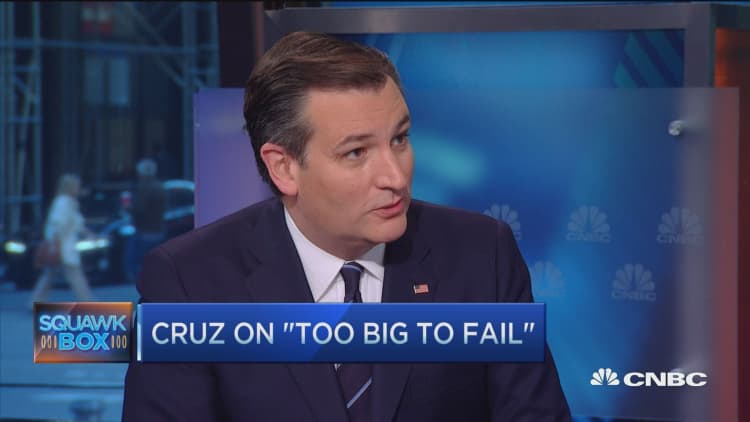
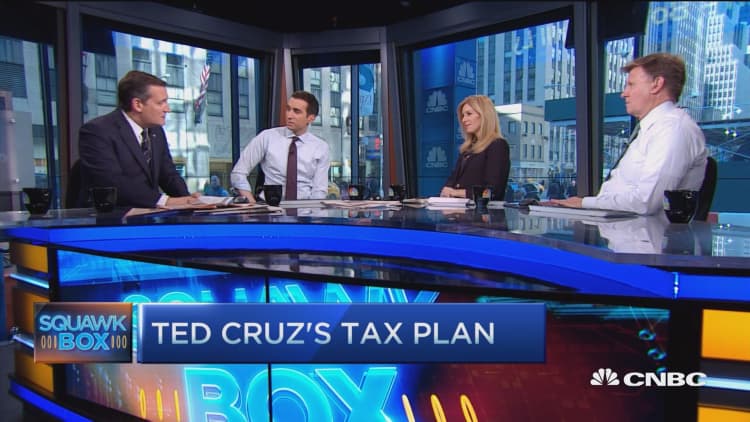

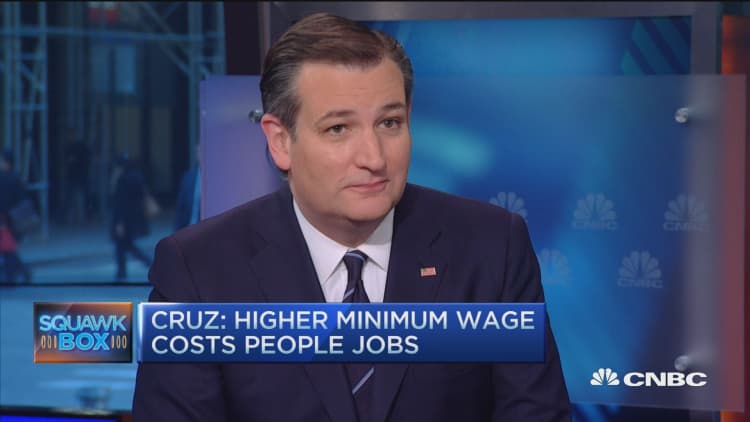
Cruz also said he believes Wall Street firms fill an "important and valuable" role, "providing capital for new enterprises, helping the economic system operate."
"But it shouldn't be the case that Wall Street plays in rigged casinos, 'heads I win, tails I win,' where Wall Street can gamble with other people's money and the government bails them out if they lose," said Cruz, whose wife, Heidi Cruz, worked at Goldman Sachs.
"If you're taking risks, you should bear the consequences of the risk. And the taxpayer shouldn't be on the hook to bail you out," the Texas senator said.
When her husband decided to run for president, Heidi Cruz took an unpaid leave of absence from Goldman.
Politico reports that Ted Cruz plans to host a fundraising event on Monday with bankers, traders and Wall Street lawyers at the Harvard Club in midtown Manhattan. Cruz has already received $12 million in support from the financial industry, according to Politico.
Cruz, who has blasted the big banks, told CNBC he has no problem taking campaign contributions from Wall Street. "We'll take money from anyone," he said.
'You can't force businesses to stay here'
Addressing the issue of corporate inversions, when American companies buy foreign firms in order to reincorporate in more favorable tax havens abroad, Cruz said the Obama administration's new rules to discourage the practice are "entirely backwards."
"We're seeing corporate inversions because of massive regulations and taxes are driving companies overseas," he said. "You can't force businesses to stay here, as the Obama Treasury Department is doing. You create an environment that businesses want to be here.
"In four years, we're going to be back here talking about corporate inversions," Cruz continued, "and it'll be Europe and Asia talking about inversions of companies coming to America because the business environment is so good."
'My No. 1 priority' as president
Cruz said his top priority as president would be to foster growth because a slow economy makes problems unsolvable. "My number one priority as president will be economic growth."
When meaningful tax reform and regulatory reform were instituted in the past, the result has been "record shattering growth," he said. "We have been trapped in stagnation for the last seven years."
As president, Cruz said he'd lift regulatory and tax burdens from small businesses.
Under his tax plan, Cruz said every individual above certain income thresholds would pay a 10 percent flat tax.
On the business side, he said he'd institute a 16 percent flat tax on companies. "The effect is an incredible catalyst for job creation and wages going up and bringing jobs back to America."
Minimum wage increases cost jobs, Cruz said, though he added it's within a state's rights to decide on wage floors. "The next time you go to a fast food restaurant and you starting ordering on an iPad, you're seeing the minimum wage. A teenager got fired."
Cruz, who has advocated in the past to shut down the government over budget issues, said he would be willing as president to compromise with Democrats, but not at the expense making a situation worse.
He blamed the GOP leadership on Capitol Hill for capitulating to President Barack Obama.
In the race for 1,237 delegates, Cruz trails Donald Trump by 756 to 545. Ohio Gov, John Kasich has 143 delegates, according to NBC News.
On Thursday night, the Texas senator received a cool reception at a New York City Republican fundraiser, following his derogatory suggestion in January that Trump, the billionaire real estate mogul with strong ties to the Big Apple, has "New York" values.
Ahead of Tuesday's primary, Cruz was No. 3 in the Real Politics average of the latest state polls with 17.9 percent support. Trump was at 53.8 percent, followed by Ohio Gov.John Kasich with 21.9 percent.
In a Wall Street Journal op-ed posted on the website Thursday night, Trump blasted Cruz and Republican elites, saying they were hiding behind the delegate selection rules to ignore the will of the voters.
Trump wrote:
"What we are seeing now is not a proper use of the rules, but a flagrant abuse of the rules. Delegates are supposed to reflect the decisions of voters, but the system is being rigged by party operatives with "double-agent" delegates who reject the decision of voters. The American people can have no faith in such a system. It must be reformed."
Trump also wrote:
"Mr. Cruz has won only three primaries outside his home state and trails me by two million votes—a gap that will soon explode even wider."
While leading in the delegate count, Trump may fall short of the 1,237 necessary to clinch the GOP nomination before the convention in July. Many political observers see the odds of a contested convention, one that goes beyond the first ballot, as a real possibility. Even if Trump comes into the convention with a plurality of delegates, subsequent ballots could put his claim to the nomination at risk.






